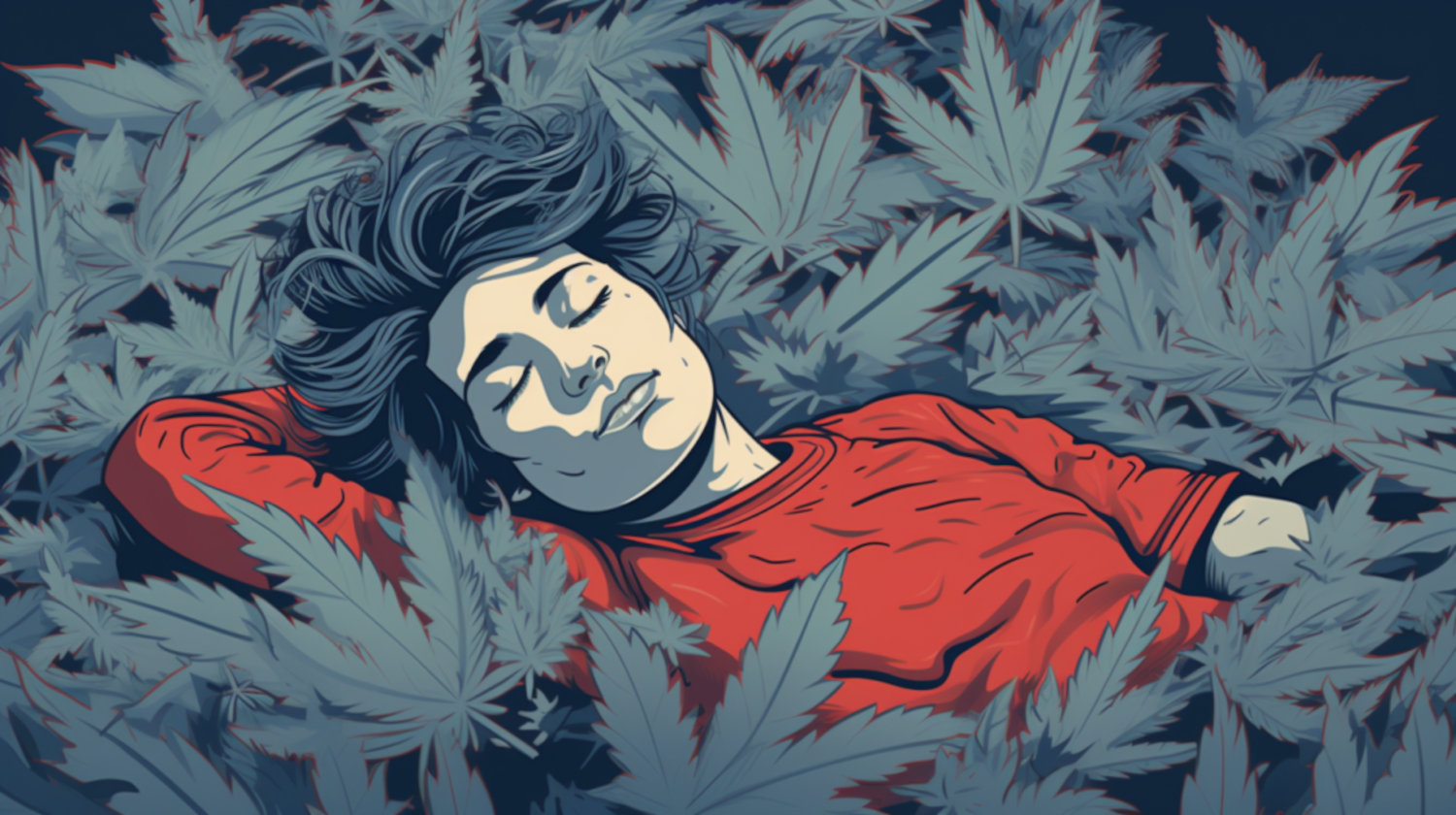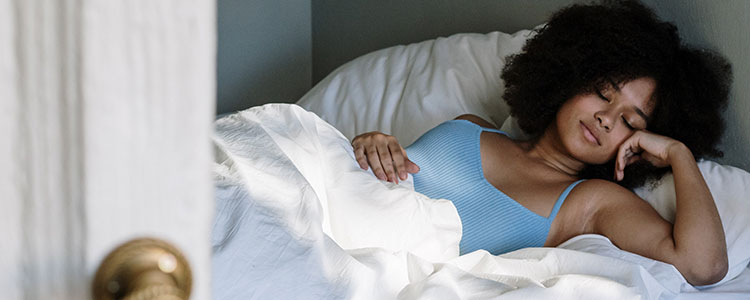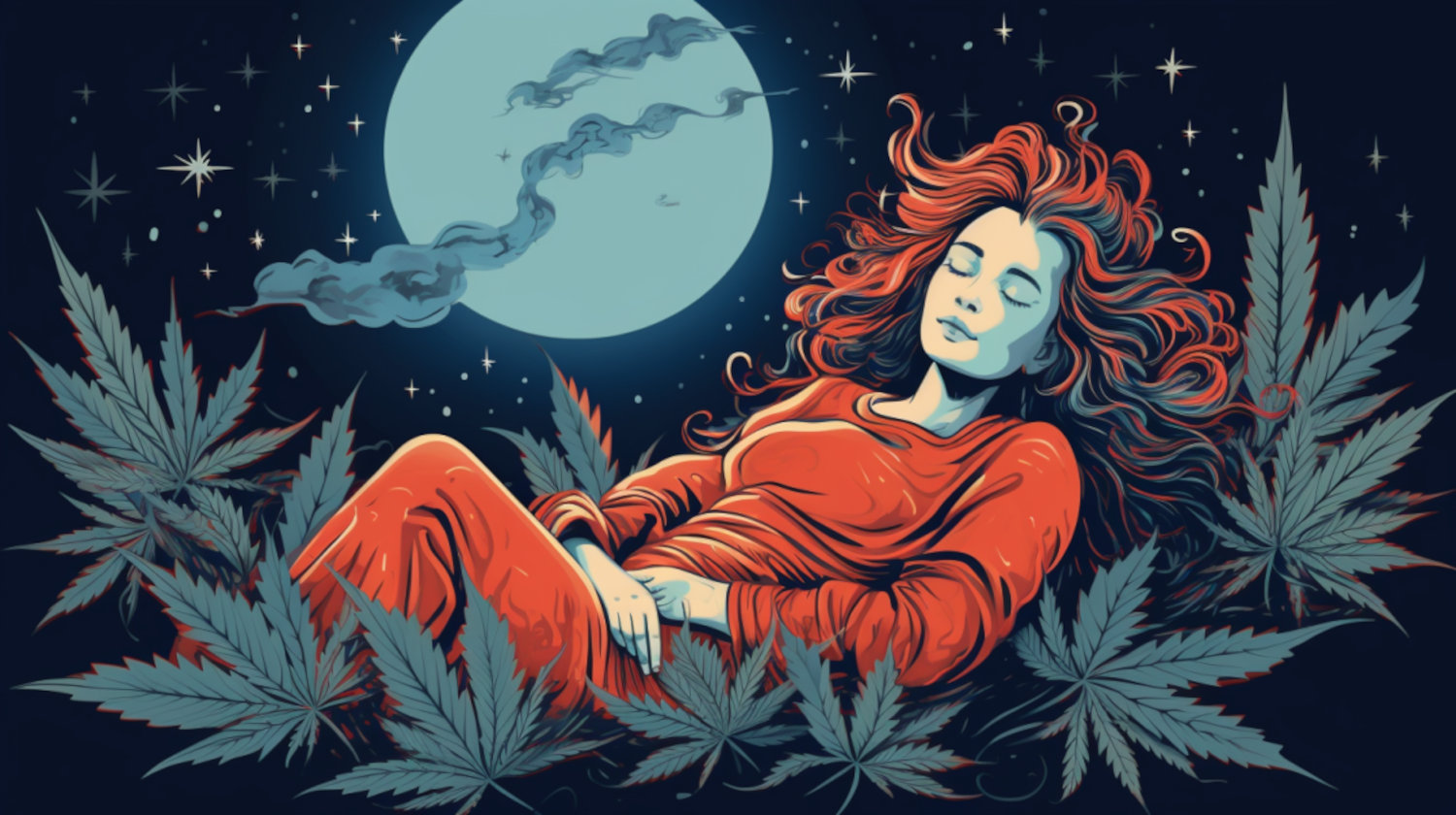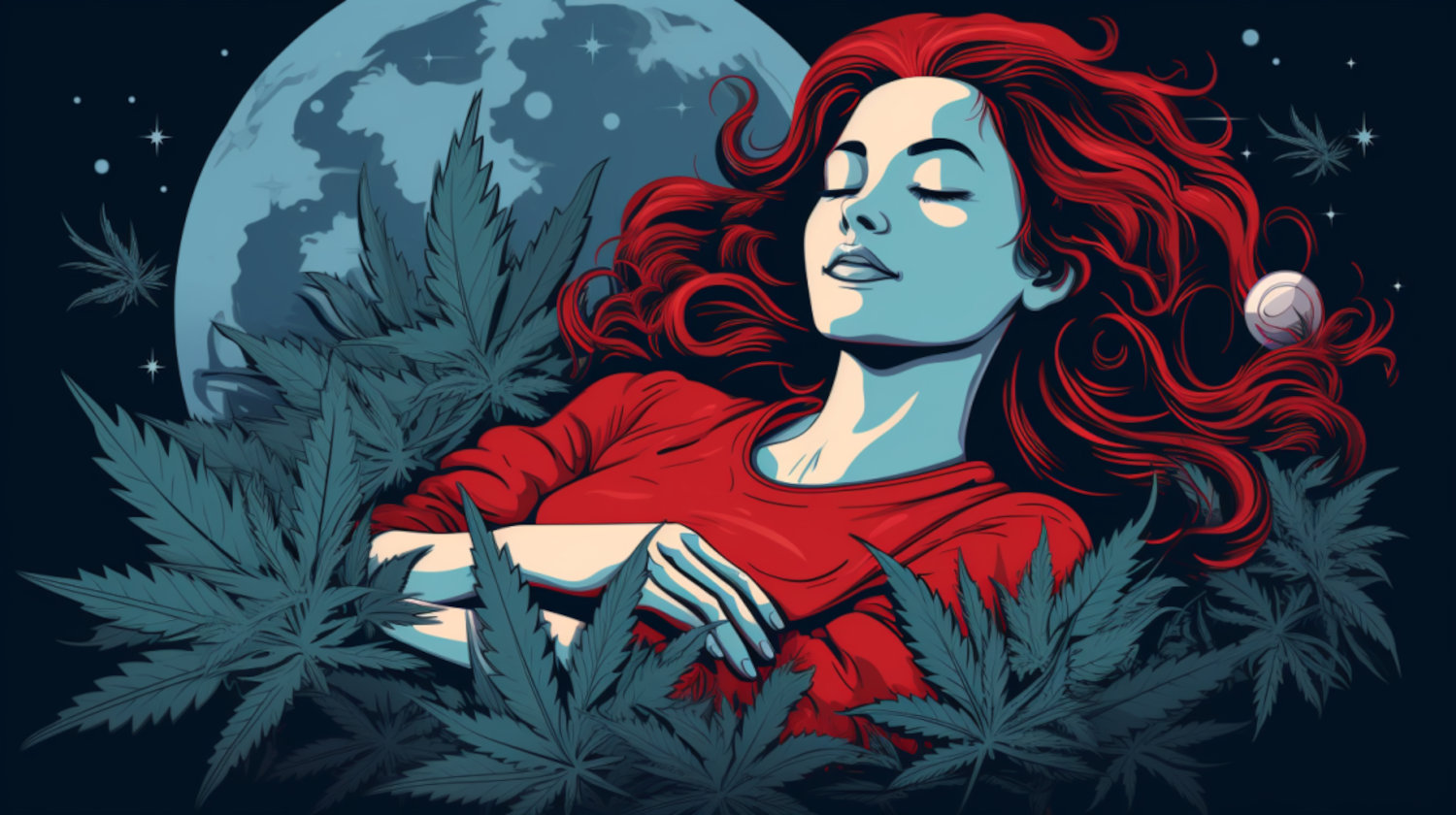Insomnia is the inability to initiate or maintain sleep. It is the most common sleep disorder, with narcolepsy, restless leg syndrome, and sleep apnea following close behind. However, none of these disorders are necessary diagnoses to have your sleep disrupted.
According to the CDC, in 2020, almost 15% of adults had trouble falling asleep most days. These troubles decreased with age and were more likely to happen in women than men.
While issues with sleeping are inconvenient, lack of shut-eye is far from the only downside. Adverse side effects and medical issues linked to poor sleep include:
- Injury,
- Chronic disease,
- Declined mental health,
- Poor quality of life,
- Rising healthcare expenses,
- Declined productivity.
Cannabis has a long-standing reputation for inducing effects helpful to sleep, like increased relaxation and reduced anxiety and pain. With the ability to produce sedative, couch-locking-type effects, many consumers utilize cannabis to help alleviate their sleep-related issues.
But is weed really a viable option for getting a good night's rest?
Does Weed Help You Sleep?
Cannabis is relatively well known for its sleep-related effects. 74% of medical cannabis patients consume it for sleep, with 84% of that group finding it extremely helpful.1 Cannabinoids may also have a vast array of other beneficial and adverse effects, making it challenging to produce claims that are applicable to everyone. Each person reacts differently. Even lab studies have yielded conflicting findings about whether cannabis is helpful or harmful for sleep quality.
While it isn’t the answer most consumers want to hear, it's essential to present all possible outcomes. Some studies highlight the direct effects of cannabis on sleep, while others focus on the effect of cannabis on related symptoms or causes.
Cannabis has been shown to impact insomnia in cases where it replaced prescription medication positively. One study examined a small group of 38 patients using cannabis for sleep disorders. While 21% experienced adverse effects, 49% of patients were able to significantly reduce or completely eliminate the use of their insomnia medication.2
Restless leg syndrome (RLS) is the uncontrollable urge to move the legs. It is also a leading cause of sleep disruption. A 2020 French study showed a positive correlation between a reduction in RLS symptoms and cannabis use. Researchers noted that patients reported near or total remission of RLS symptoms when using cannabis.3
Mental health disorders like depression and anxiety can cause sleep issues. In 2019, an analysis of adult psychiatric patients with sleep disorders observed the effects of medical cannabis and psychiatric medication. The combination improved anxiety levels and sleep scores during the first month. Although sleep scores fluctuated, anxiety level scores remained improved in the following months.4
One study found that patients with post-traumatic stress disorder (PTSD) are more likely to consume cannabis. Sleep was their highest motivator for use, although the relationship is more of a coping mechanism.5 Research notes there is a need for further examination of the health consequences of cannabis on PTSD.
In some situations, cannabis may have little or no effect or cause more sleep disruption. In 2016, a study of 98 individuals noted that after accounting for depression and anxiety symptoms, cannabis had an insignificant impact on sleep. Researchers also reported that daily cannabis users have more sleep disturbances than their counterparts.6
Sleep apnea is a sleep disorder where the throat muscles relax excessively during sleep, preventing breathing. It can range from mild to severe and, in rare cases, cause death. In 2018, the American Academy of Sleep Medicine stated that cannabis did not help treat Obstructive Sleep Apnea (OSA). With limited reports of its efficacy and minimal lab research, the group concluded that "due to unreliable delivery methods and insufficient evidence of effectiveness, tolerability, and safety,” cannabis was not recommended for treatment of OSA.7
Regarding which cannabinoid is best for sleep, THC or CBD, the answer depends on the dosage. In general, THC is better suited for inducing sedative effects, while CBD, especially in small doses, tends to cause more alertness.8 One study found that equal doses of CBD to THC may counteract the intoxicating effects of THC.9 On the opposite end of the spectrum, high doses of CBD have been found to induce sedative effects.4
With so much uncertainty, it's easy for those suffering from sleep issues to feel frustrated. If you’re interested in using cannabis for your sleep disorder or related symptoms, it may be best to consult a doctor, especially if you’re taking medication. Stay open to different options and dosages, and stop cannabis consumption if you experience any adverse side effects.
How Does Weed Work as a Sleep Aid?
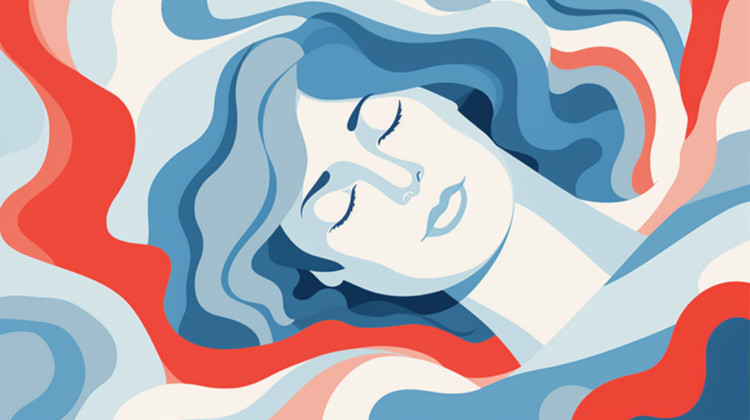
Sleep is regulated by neurotransmitters that shut down the arousal system in the brain.
One of the primary neurotransmitters of this process is gamma-aminobutyric acid, or GABA, which is released by the hypothalamus, a part of the brain that controls the onset of sleep. It triggers the brain to slow down by blocking specific signals in the central nervous system (CNS).
Human sleep cycles through two phases of REM (rapid eye movement) and NREM (non-rapid eye movement) four to six times a night. This cycle is controlled by the circadian rhythm, driven by the suprachiasmatic nucleus (SCN) located within the hypothalamus. Other parts of the brain involved in regulating sleep include:
- The hippocampus is the memory region active during dreaming
- The amygdala is the emotion center active during dreaming.
- The thalamus prevents sensory signals from reaching the cortex.
- The reticular formation regulates the transition between sleep and wakefulness.
- The pons helps to initiate REM sleep.
One extensive literature review found research that supports cannabis’ ability to interact with almost all of these brain functions to help play a role in sleep.
Researchers note the endocannabinoid system's role. Its CB1 receptors are located in certain parts of the brain, like the thalamus, hypothalamus, cortex, hippocampus, limbic system, and basal ganglia. CB1 receptors in areas like the pons and basal forebrain, specifically, may play a role in the sleep-wake cycle. The researchers also suggest that the serotonergic system is enhanced by CB1 receptors, which could also play an important role in the sleep-wake cycle.
These researchers reviewed the effects of low dose, chronic use, and withdrawal from cannabis and sleep. Low-dose usage had inconsistent effects on sleep, while high-dose users experienced more adverse effects on their sleep quality. Withdrawal from cannabis caused sleep disruptions and vivid dreams.10
Other studies examining the relationship between cannabis and sleep also reveal mixed results. A 2014 University of Penn review of 39 manuscripts notes that cannabis improves sleep quality without impacting sleep times. However, the team also stated that most studies carried a substantial risk for bias, and the group cautioned that more research on dosing and impact is required.11
It seems as though regardless of how cannabis plays a role in sleep physiology, it is a substance people use to improve their quality of rest. A 2022 report by the Sleep Foundation noted that many self-medicate with cannabis to treat their sleep, insomnia, anxiety, and pain issues. Seemingly refuting this anecdotal evidence, it also concluded that regular cannabis use had been linked to increased sleep-related problems.
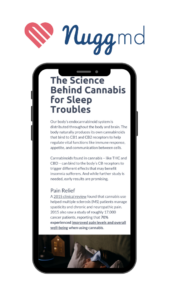
Fall asleep faster and wake up feeling more rested with our comprehensive (and completely free) patient’s guide to medical cannabis for sleep troubles.
What Weed Strains and Products are Best for Sleep?
No definitive answer exists on which cannabis product is best suited for sleep. It’s best to start by noting which symptom you want to address affecting your sleep. Do you have trouble falling asleep? Staying asleep? Is it because of pain or stress? The right answer for you is found in discovering the right mode of consumption combined with the right balance of cannabinoids and terpenes.
The average dispensary and products aren’t quite set up to shop based on terpenes and cannabinoid concentrations beyond THC and CBD. You will likely see products divided into categories and then separated into indica, sativa, or hybrid. There is a valid discourse about these terms not meaning what they should, and consumers should focus on the terpenes and cannabinoid ratios rather than the label when trying to find the best strains for insomnia. Occasionally, and more frequently, companies have begun to list their top terpenes on flower and concentrate products.
Cannabis products with high levels of terpenes like myrcene, pinene, and linalool, may aid sleep, reduce stress, and ease pain.12,13 It’s important to note that these terpenes can be found in almost any inhalable cannabis product, so it is more important to focus on the terpene content than the indica or sativa label. Two of the most notable cultivars for sleep, according to consumers, are Northern Lights and Grand Daddy Purple.
Most studies recommend high-THC products for sleep, but it may just be a matter of finding the right dosage. Low doses of CBD tend to promote wakefulness, while higher doses of CBD may be better suited to induce sleep. Low-dose THC shows mixed results for sleep, but the high dose strains may be more disruptive to sleep than helpful.4,8
Some products are specifically formulated with cannabinoids like CBN and marketed as a powerful sleep aid, but research on CBN hasn't exactly caught up to anecdotal reports. This sedative potential of CBN might be in part due to CBN's low affinity for the CB1 receptor, but so far, no research supports the use of CBN for sleep.14 However, a clinical trial is currently underway examining the effects of CBN on insomnia.15
While the options can be overwhelming, start with the most basic choice (low-dose THC or CBD), take notes on your experience, and adjust your next purchase accordingly. Even if you find the right product, it may change over time.
The mode of consumption you choose is a personal preference. You may want to note the onset and duration of each product before deciding which one is right for you.
Smoking flower or concentrates will provide effects within moments and last only a few hours. Tinctures have a quick onset time of about 15 minutes, with effects lasting several hours. Edibles for sleep – most consumer's first choice – take the longest to feel. Effects can happen anywhere from 30 minutes to 2 hours after consumption and last several hours or even into the next day.16
While cannabis has shown promise as a sleep aid, the evidence remains mixed and inconclusive. Unfortunately, the only real option left is to form opinions based on early-stage research and anecdotal evidence. Consumers should use caution and consume cannabis responsibly.
What Are the Risks and Side Effects of Using Weed for Sleep?
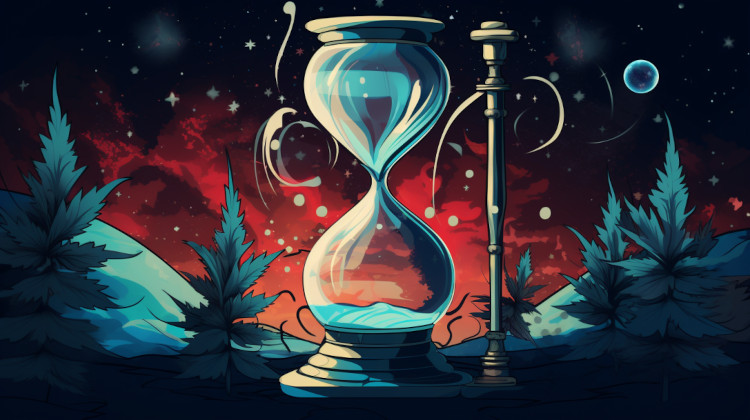
Doctors recommend considering a few factors when consuming cannabis for sleep.17
Tolerance – Over time, it’s normal to build up a tolerance to THC, eventually requiring higher dosages to induce the same effects.
Dosages – Low dosages have mixed effectiveness on sleep, while daily and high-dose usage has been linked to higher rates of sleep disruptions.10
Potential adverse effects – Depending on the type of cannabis and the individual consuming it, cannabis may worsen sleep or specific symptoms like anxiety.18 It also has the potential to stimulate the mind and body, which may have undesirable effects on sleep.
Other drug interactions – Cannabis has the potential to interact with other medications. A sleep medication's effects may intensify and cause dangerous and uncomfortable side effects when consumed with cannabis.
Practical and Safety Tips When Using Weed for Sleep
For the best experience with cannabis and sleep, consider the following tips:
Onset time – You’ll want to make sure you consume your cannabis at least an hour or two before you’d like to fall asleep. Taking your dosage too close to bedtime, especially if you’re taking edibles, may lead to oversleeping or grogginess. Adjust this time based on the onset time of each method of consumption.
One remedy at a time – Using just one treatment method is best. Combining prescription, over-the-counter medication, and cannabis may lead to adverse effects. Cannabis should also not be consumed with alcohol.
Start low and go slow – Start with the lowest dose you think you’ll need and only consume more once you feel the full effects.
Stay open and curious – It may take a few attempts with the same product or shifting through a couple of options before you find your perfect match. Taking note of how each product affects you will help guide you to the right one.
Chat with a professional – If you think you have a sleep disorder, have already been diagnosed with one, or are treating sleep issues, it may be best to talk to a doctor before adding cannabis to your regimen.
References
- Bachhuber M, Arnsten JH, Wurm G. Use of Cannabis to Relieve Pain and Promote Sleep by Customers at an Adult Use Dispensary. J Psychoactive Drugs. 2019;51(5):400-404. doi:10.1080/02791072.2019.1626953
↩︎ - Vaillancourt R, Gallagher S, Cameron JD, Dhalla R. Cannabis use in patients with insomnia and sleep disorders: Retrospective chart review. Can Pharm J (Ott). 2022;155(3):175-180. Published 2022 Apr 15. doi:10.1177/17151635221089617
↩︎ - Ghorayeb I. More evidence of cannabis efficacy in restless legs syndrome. Sleep and Breathing. 2019;24(1):277-279. doi:https://doi.org/10.1007/s11325-019-01978-1
↩︎ - Shannon S. Cannabidiol in Anxiety and Sleep: A Large Case Series. The Permanente Journal. 2019;23(1). doi:https://doi.org/10.7812/tpp/18-041
↩︎ - Bonn‐Miller MO, Babson KA, Vandrey RG. Using cannabis to help you sleep: Heightened frequency of medical cannabis use among those with PTSD. Drug and Alcohol Dependence. 2014;136:162-165. doi:https://doi.org/10.1016/j.drugalcdep.2013.12.008
↩︎ - Conroy DA, Kurth ME, Strong DR, Brower KJ, Stein MD. Marijuana use patterns and sleep among community-based young adults. J Addict Dis. 2016;35(2):135-143. doi:10.1080/10550887.2015.1132986
↩︎ - Ramar K, Rosen IM, Kirsch DB, et al. Medical Cannabis and the Treatment of Obstructive Sleep Apnea: An American Academy of Sleep Medicine Position Statement. J Clin Sleep Med. 2018;14(4):679-681. Published 2018 Apr 15. doi:10.5664/jcsm.7070
↩︎ - Murillo-Rodríguez E, Sarro-Ramírez A, Sánchez D, et al. Potential effects of cannabidiol as a wake-promoting agent. Curr Neuropharmacol. 2014;12(3):269-272. doi:10.2174/1570159X11666131204235805
↩︎ - Kolla BP, Hayes L, Cox C, Eatwell L, Deyo-Svendsen M, Mansukhani MP. The Effects of Cannabinoids on Sleep. J Prim Care Community Health. 2022;13:21501319221081277. doi:10.1177/21501319221081277
↩︎ - Kaul M, Zee PC, Sahni AS. Effects of Cannabinoids on Sleep and their Therapeutic Potential for Sleep Disorders. Neurotherapeutics. 2021;18. doi:https://doi.org/10.1007/s13311-021-01013-w
↩︎ - Gates, Peter J., Lucy Albertella, and Jan Copeland. 2014. “The Effects of Cannabinoid Administration on Sleep: A Systematic Review of Human Studies.” Sleep Medicine Reviews. 18 (6): 477–87. https://doi.org/10.1016/j.smrv.2014.02.005.
↩︎ - Surendran S, Qassadi F, Surendran G, Lilley D, Heinrich M. Myrcene-What Are the Potential Health Benefits of This Flavouring and Aroma Agent?. Front Nutr. 2021;8:699666. Published 2021 Jul 19. doi:10.3389/fnut.2021.699666
↩︎ - Weston-Green K, Clunas H, Jimenez Naranjo C. A Review of the Potential Use of Pinene and Linalool as Terpene-Based Medicines for Brain Health: Discovering Novel Therapeutics in the Flavours and Fragrances of Cannabis. Front Psychiatry. 2021;12:583211. Published 2021 Aug 26. doi:10.3389/fpsyt.2021.583211
↩︎ - Corroon J. Cannabinol and Sleep: Separating Fact from Fiction. Cannabis Cannabinoid Res. 2021;6(5):366-371. doi:10.1089/can.2021.0006
↩︎ - Lavender I, McCartney D, Marshall N, et al. Cannabinol (CBN; 30 and 300 mg) effects on sleep and next-day function in insomnia disorder ('CUPID' study): protocol for a randomised, double-blind, placebo-controlled, cross-over, three-arm, proof-of-concept trial. BMJ Open. 2023;13(8):e071148. Published 2023 Aug 23. doi:10.1136/bmjopen-2022-071148
↩︎ - MacCallum CA, Russo EB. Practical considerations in medical cannabis administration and dosing. European Journal of Internal Medicine. 2018;49:12-19. doi:10.1016/j.ejim.2018.01.004
↩︎ - MacCallum CA, Lo LA, Boivin M. “Is medical cannabis safe for my patients?” A practical review of cannabis safety considerations. European Journal of Internal Medicine. 2021;89:10-18. doi:https://doi.org/10.1016/j.ejim.2021.05.002
↩︎ - Sharpe L, Sinclair J, Kramer A, Michael, Sarris J. Cannabis, a cause for anxiety? A critical appraisal of the anxiogenic and anxiolytic properties. Journal of Translational Medicine. 2020;18(1). doi:https://doi.org/10.1186/s12967-020-02518-2
↩︎
The information in this article and any included images or charts are for educational purposes only. This information is neither a substitute for, nor does it replace, professional legal advice or medical advice, diagnosis, or treatment. If you have any concerns or questions about laws, regulations, or your health, you should always consult with an attorney, physician or other licensed professional.

